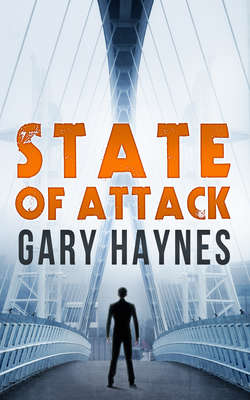Читать книгу State Of Attack - Gary Haynes - Страница 17
ОглавлениеChapter 8
Tom had driven for nearly an hour. It was dawn, the muted outline of the fading crescent moon flanked by rolling cumulous clouds. His retreat seemed as if it was in the remote countryside, despite being only about a mile from Arlington County. A hundred-year-old, two-storey farmhouse surrounded on three sides by cornfields and elm coppices. Situated on the banks of the Potomac River, which was a natural border between Virginia and DC, its location was just about perfect for him.
He parked his ten-year-old silver Buick Century and got out. He walked over the flint-ridden path to the porch, admiring the apple orchard nearby. It was skirted by a tarmac walkway that led to a narrow road. On either side of the path, a pristine lawn sloped gently all the way down to the tree-lined banks of the river.
He could just about make out a patch of water in the half-mile-wide stretch. He could relax here and forget about the world of the Bureau of Diplomatic Security, at least for as long as he wasn’t contacted via his secure cellphone. He paid a part-time gardener to look after the grounds and keep an eye on his collection of bonsai trees, the man’s wife helping out with cleaning now and then; but apart from them, people rarely visited. He lived alone.
When he couldn’t afford the time to drive up here he stayed in his small redbrick townhouse in Columbia Heights, a couple of blocks from the Metro station, located in the north-west quadrant of DC. It was an ethnically diverse neighbourhood that had been left semi-derelict for decades after the assassination of Martin Luther King, Jr, in 1968. But the last twenty years had seen significant redevelopment, with a burgeoning middle class and an influx of brand names. But he still felt solitary, even there.
The farmhouse was voluminous, some three thousand square yards, with high ceilings and moulded cornices. It had been bequeathed to him from his paternal grandfather, although they had only met on a couple of occasions, due to his sporadic relationship with the general. Once inside, he turned on a lamp and drew the heavy drapes, before tossing his laptop case onto a sofa and tugging at his silk tie. Strolling to the pastel-blue kitchen, with a Picasso calendar on the wall, he glanced at the time on the microwave on the polished granite tabletop, beside the digital radio: 05:12.
After eating a three-egg omelette, he stood up and strolled through the archway into his study area, holding a mug of black coffee. The house seemed overly large now, and he only used a few of the rooms. Switching on the ceiling light, he walked over to the leaded window, made an opening in the off-white Venetian blinds.
Catching a glimpse of his reflection in the windowpane, he thought he looked tired and apprehensive. Moments later, the local fox emerged from a small copse of trees. It had something in its mouth that looked like the carcass of a dead rodent. Something it had hunted down and killed, rather than scavenged. It looked up at him for a few seconds before returning to the shadows.
Two of the study’s walls were lined with bookshelves, containing numerous first editions that had belonged to his grandfather. On the third, hanging at a height of two yards above a console table nestled against the wall, was an original by Tsuguharu Foujita, a Japanese artist who’d applied traditional Oriental ink techniques to French themes. The painting was of a blonde, bare-breasted woman, her head turned to one side. He considered it exquisite. A painting he said expressed perfectly his dual love of European and Far East art. Like all the other art in the house, the Foujita was his.
Sitting at the table, he fired up his home laptop. The screensaver was a photograph of the Empire State Building. An avid collector of trivia, he still marvelled at an extraordinary fact every time he looked at the image. The skyscraper was one hundred and two storeys high. On July 28, 1945, a B-25 bomber had crashed into the side of it by accident, killing fourteen people. Remarkably, the elevator operator, one Betty Lou Oliver, had survived a descent of seventy-five storeys, actually inside the elevator. It was still the longest recorded fall of its kind.
He grinned, as he always did when he recounted her unintended escapade.
He didn’t like to check his private emails on his work smartphone and considered it inappropriate to carry a separate private one, so having a laptop here and at the townhouse was his way of keeping in touch with his few friends. Lester Wilson, an ex-US Marine who owned a private security business, and the only man Tom could call a true friend, had sent him a series of un-PC picture jokes. He knew he did it partly to wind him up and partly to loosen him up. There was no malice in Lester, except if someone was stupid enough to cross him. His punch was like a kick from a tormented mule.
After reading a few other emails from service providers and deleting promotional spam, he closed the laptop down, thinking that he hadn’t seen Lester in a while, despite both of them being based in DC, and made a mental note to catch up once he’d seen his father.
He stretched his arms up involuntarily and yawned loudly. He hadn’t slept in twenty hours but he was almost beyond it. He decided that he’d check on his bonsai plants, try to relax his mind and then hit the sack.
